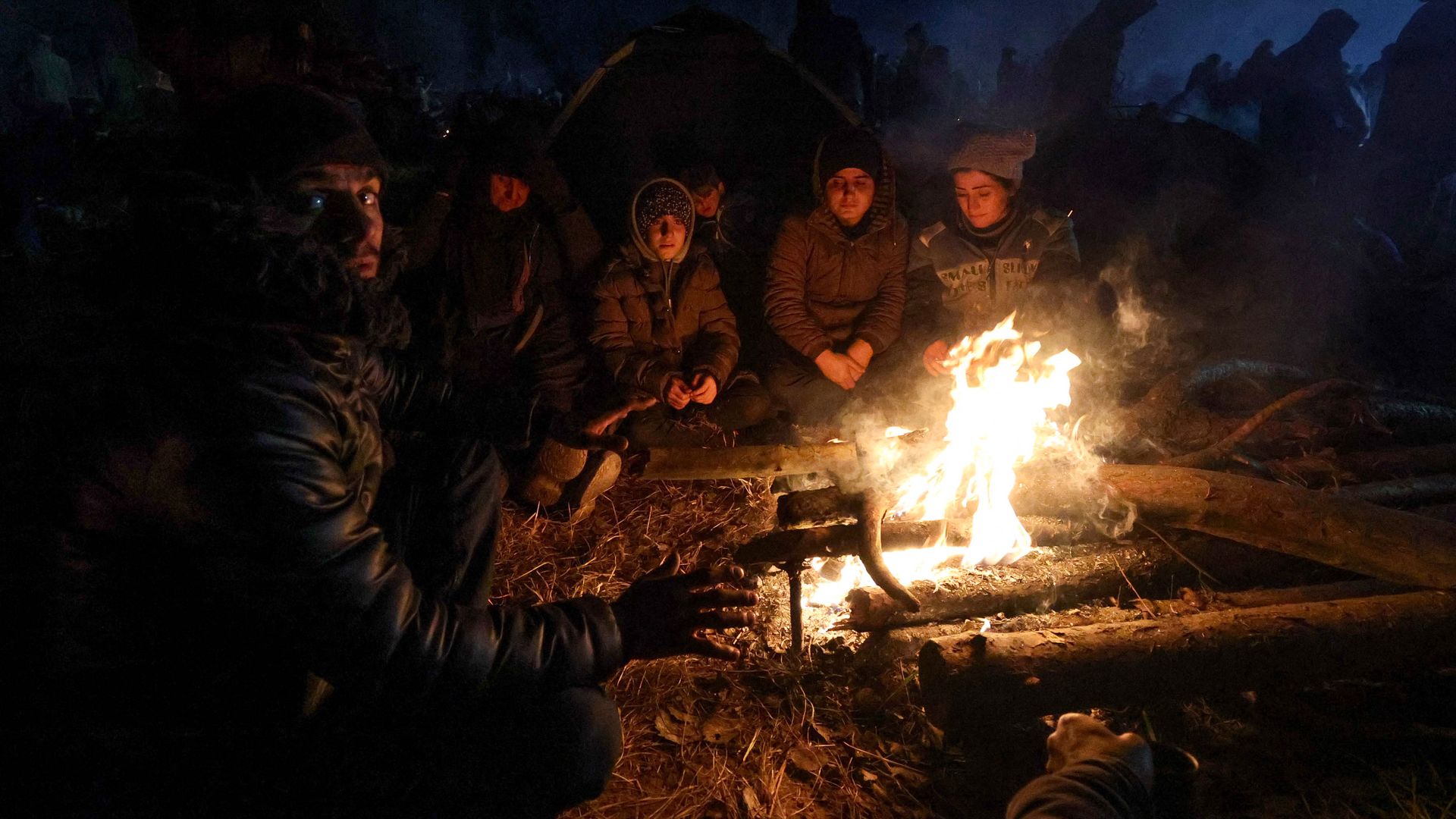Migrants freezing to death on EU frontier
Add Axios as your preferred source to
see more of our stories on Google.

Migrants warm themselves on the Belarusian side of the border. Photo: Maxim Guchek/BELTA/AFP via Getty
Migrants are "dying in the snow" along the Belarus-Poland border, caught in freezing temperatures between hostile border guards from both countries and cut off from lifesaving aid, Stefan Lehmeier of the International Rescue Committee told Axios.
Context: Lehmeier spoke by phone with Axios Monday, immediately after helping to administer first aid to three Iraqi men suffering from hypothermia in a forest on the Polish side of the border. Lehmeier and his fellow aid workers gave them blankets, hot soup and waterproof boots.
- "We're really worried because it's getting so cold now that I don't think, even with the stuff we left them with, they'll have a good chance of survival," said Lehmeier, the IRC's deputy Europe director.
Driving the news: EU officials accuse Belarusian dictator Aleksandr Lukashenko of waging "hybrid warfare" on the bloc — which has sanctioned Lukashenko for election-rigging and other abuses — by allowing thousands of migrants to travel from the Middle East to Minsk and then pushing them to the border.
- Desperate to reach Poland and, thus, the EU, the migrants are "pawns in the hands of the Belarus forces," which choose when and how they attempt to cross, Lehmeier said. In some cases, they've physically forced people across barbed-wire barriers, Lehmeier noted.
Polish authorities have responded by establishing an "exclusion zone" reaching up to 3 miles into Polish territory. Journalists and aid workers are barred from entering and, Lehmeier says, migrants discovered there are being illegally forced back to the border.
- There have been cases of migrants crossing a frigid river to Poland and then immediately being forced back into the water when they reach the other side, Lehmeier adds.
- NGOs have established a hotline to dispatch aid to those who reach Poland, but the migrants "are so afraid of everyone that they only call someone to come to them — they only give away their coordinates, so to speak — if they know that if they don't do that, this will be the end," Lehmeier said.
- Border guards are "tracking us and harassing us," Lehmeier said. Meanwhile, volunteers from Poland's Territorial Defense Forces seem to be acting as vigilantes, he said, searching for refugees and puncturing the tires of the aid workers seeking to help them.
"There's a good chance that next spring or whenever this exclusion zone is lifted, local residents or border guards might go through this forest and find corpses everywhere."— Stefan Lehmeier
State of play: On the Belarusian side of the border, officials cleared a large refugee camp in recent days and relocated around 2,000 people to a warehouse.
- A few hundred Iraqis have boarded repatriation flights, many of them already having spent their life savings trying to reach the EU. Officials in Brussels are scrambling to stop additional flights to Belarus and are hoping Lukashenko may be backing down.
- Still, Polish officials contend that every night, Belarusian forces are pushing more migrants to the border.
On the Polish side, there seems to be no clear system for who is sent back across the border, who is taken to a detention center, and who might actually get to claim asylum, Lehmeier said.
- "There basically is no rule of law right now here in the border zone," he said.
DThe big picture: The situation is representative of the EU's wider approach to migration at its external borders, Lehmeier notes, whether that be in the Mediterranean Sea or the Polish snow.
Go deeper: The NYT on why Iraqi migrants are risking everything.
